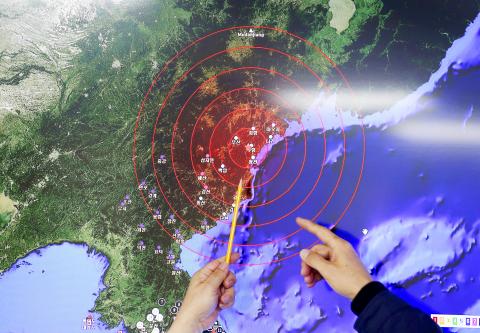North Korea yesterday said it successfully tested a miniaturized hydrogen nuclear device, claiming a significant advance in its strike capability and setting off alarm bells in Japan and South Korea.
The test, the fourth time the state has exploded a nuclear device, was ordered by young leader Kim Jong-un and successfully conducted at 10am, the official Korean Central News Agency said.
“Let the world look up to the strong, self-reliant nuclear-armed state,” Kim wrote in what North Korean state TV displayed as a handwritten note.

Photo: Reuters
The reported nuclear test drew condemnation abroad.
While a fourth nuclear test had been long expected, the claim that it was a hydrogen device, much more powerful than an atomic bomb, came as a surprise, as did the timing.
However, South Korean intelligence officials and several analysts questioned whether yesterday’s explosion was indeed a full-fledged test of a hydrogen device.
The device had a yield of about 6 kilotonnes, according to a South Korean lawmaker on the parliamentary intelligence committee — about the same size as the North’s last test, which was equivalent to 6 to 7 kilotonnes of TNT.
“Given the scale, it is hard to believe this is a real hydrogen bomb,” said Yang Uk, a senior research fellow at the Korea Defense and Security Forum and a policy adviser to the South Korean navy.
“They could have tested some middle stage kind [of device] between an A-bomb and H-bomb, but unless they come up with any clear evidence, it is difficult to trust their claim,” he said.
Joe Cirincione, a nuclear expert who is president of Ploughshares Fund, a global security organization, said North Korea might have mixed a hydrogen isotope in a normal atomic fission bomb.
“Because it is, in fact, hydrogen, they could claim it is a hydrogen bomb,” he said. “But it is not a true fusion bomb capable of the massive multi-megaton yields these bombs produce.”
The US Geological Survey reported a magnitude 5.1 earthquake that South Korea said was 49km from the Punggye-ri site where the North has conducted nuclear tests in the past.
The claim of miniaturizing, which would allow the device to be adapted as a weapon and placed on a missile, would also pose a new threat to the US, Japan and South Korea.
However, the North’s previous miniaturization claims have not been independently verified.
Japanese Prime Minister Shinzo Abe said Tokyo would make a firm response to North Korea’s challenge against nuclear non-proliferation.
South Korea said it would take all possible measures, including possible UN sanctions, to ensure Pyongyang paid the price after its fourth nuclear test.
“The government must now work closely with the international community to ensure that North Korea pays the commensurate price for the latest nuclear test,” South Korean President Park Geun-hye said in a statement.
“We must respond decisively through measures such as strong international sanctions,” she said.
The EU said that the test, if confirmed, would be a grave violation of international obligations.
NATO condemned the test, Kremlin spokesman Dmitry Peskov said Russia was “extremely worried” and China urged the North to honor its commitment to denuclearization.

The CIA has a message for Chinese government officials worried about their place in Chinese President Xi Jinping’s (習近平) government: Come work with us. The agency released two Mandarin-language videos on social media on Thursday inviting disgruntled officials to contact the CIA. The recruitment videos posted on YouTube and X racked up more than 5 million views combined in their first day. The outreach comes as CIA Director John Ratcliffe has vowed to boost the agency’s use of intelligence from human sources and its focus on China, which has recently targeted US officials with its own espionage operations. The videos are “aimed at

STEADFAST FRIEND: The bills encourage increased Taiwan-US engagement and address China’s distortion of UN Resolution 2758 to isolate Taiwan internationally The Presidential Office yesterday thanked the US House of Representatives for unanimously passing two Taiwan-related bills highlighting its solid support for Taiwan’s democracy and global participation, and for deepening bilateral relations. One of the bills, the Taiwan Assurance Implementation Act, requires the US Department of State to periodically review its guidelines for engagement with Taiwan, and report to the US Congress on the guidelines and plans to lift self-imposed limitations on US-Taiwan engagement. The other bill is the Taiwan International Solidarity Act, which clarifies that UN Resolution 2758 does not address the issue of the representation of Taiwan or its people in

US Indo-Pacific Commander Admiral Samuel Paparo on Friday expressed concern over the rate at which China is diversifying its military exercises, the Financial Times (FT) reported on Saturday. “The rates of change on the depth and breadth of their exercises is the one non-linear effect that I’ve seen in the last year that wakes me up at night or keeps me up at night,” Paparo was quoted by FT as saying while attending the annual Sedona Forum at the McCain Institute in Arizona. Paparo also expressed concern over the speed with which China was expanding its military. While the US

SHIFT: Taiwan’s better-than-expected first-quarter GDP and signs of weakness in the US have driven global capital back to emerging markets, the central bank head said The central bank yesterday blamed market speculation for the steep rise in the local currency, and urged exporters and financial institutions to stay calm and stop panic sell-offs to avoid hurting their own profitability. The nation’s top monetary policymaker said that it would step in, if necessary, to maintain order and stability in the foreign exchange market. The remarks came as the NT dollar yesterday closed up NT$0.919 to NT$30.145 against the US dollar in Taipei trading, after rising as high as NT$29.59 in intraday trading. The local currency has surged 5.85 percent against the greenback over the past two sessions, central